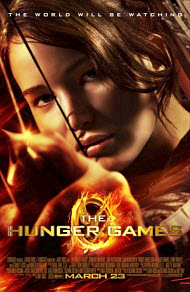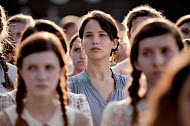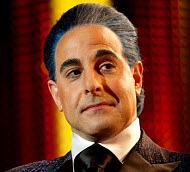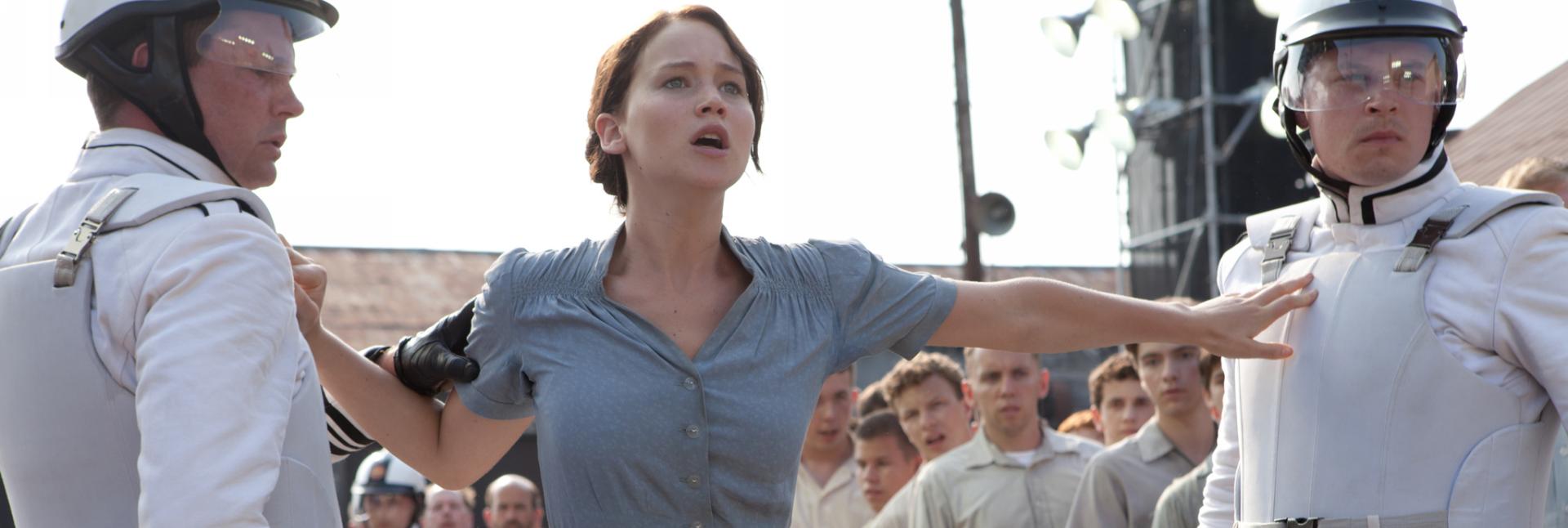The Hunger Games
 for intense violent thematic material and disturbing images—all involving teens.
for intense violent thematic material and disturbing images—all involving teens.
Reviewed by: Jeremy Landes
CONTRIBUTOR
| Moral Rating: | Very Offensive |
| Moviemaking Quality: |
|
| Primary Audience: | Teens Adults |
| Genre: | Sci-Fi Thriller Drama Adaptation |
| Length: | 2 hr. 22 min. |
| Year of Release: | 2012 |
| USA Release: |
March 23, 2012 (wide—4,000+ theaters) DVD: August 18, 2012 |





Does The Hunger Games phenomena have “the possibility to catalyze, motivate, mobilize a generation of young people who were… by and large dormant in the political process“?

Katniss substitutes herself for her sister—SELF-SACRIFICE / importance of protecting the young and innocent / help those in need / be compassionate in your actions
Are you living a COMPASSIONATE life? (getting involved in helping those who are suffering)
“How do you feel about the fact that some people take their next meal for granted when so many other people are starving?”
If real people in our world, who are truly suffering, looked at your life, what would they see? Would your life seem frivolous? Self-indulgent? Excessive?
Katniss generally relies on flight and ingenuity to avoid unnecessary killing. Why?
Every human life is valuable. The taking of lives is tragic.
Refuse to give in to evil.
Refuse to compromise about what is truly right and good.
RIGHT AND WRONG—Are we living in a moral Stone Age? Answer

bravery and courage
Evil governments, and our enemy the Devil, use FEAR to control people. How can we overcome that?
OVERCOMING FEAR—What does the Bible say? Answer
importance of personal freedom

dangers of big government control
What are the mechanics of totalitarian governments?
society in a repressive and controlled state, under the guise of being utopian
compare the film’s live televised spectacles to the ancient Roman Colosseum’s games and events, produced for public entertainment and political control
the trilogy’s coming constant battle for freedom against tyranny

media control and manipulation / What are the ways that media “play” the masses in the favor of those in control?
What is generally wrong with the way celebrity is created in our culture?
Are today’s youth being overexposed to contrived reality on television, leading to a detachment from images of others’ real pain and terror?
“What’s your relationship to reality TV versus your relationship to the news?”

Author Suzanne Collins says, “Too much of people’s lives are put on television, and we’re desensitised to actual tragedy unfolding before us.”
Are young people today becoming desensitized to the real world violence around them?


| Featuring |
|---|
|
Jennifer Lawrence … Katniss Everdeen Josh Hutcherson … Peeta Mellark Liam Hemsworth … Gale Hawthorne Elizabeth Banks … Effie Trinket Woody Harrelson … Haymitch Abernathy Stanley Tucci … Caesar Flickerman Donald Sutherland … President Snow Toby Jones … Claudius Templesmith Amandla Stenberg … Rue Lenny Kravitz … Cinna Isabelle Fuhrman … Clove Wes Bentley … Seneca Crane See all » |
| Director |
|
Gary Ross |
| Producer |
|
Color Force Larger Than Life Productions Lionsgate See all » |
| Distributor |
“The world will be watching”
The Hunger Games phenomenon (first the novel, now a blockbuster movie) is, at its core, about how a government uses the media to control its population. In this fantasy future world, an annual lottery forces 24 teenagers (called “tributes,” from 12 districts) to participate in a reality television spectacle called the Hunger Games, where they will be forced to kill one another. The reason stated for these Games is to remind formerly rebellious districts that their government is still firmly in control.
This weekend, millions of Americans will be piling into theatres and mirroring the film’s fictional audience that cheers for their favorite tribute and bets on on who will kill all the other teens. Our own money is on Katniss Everdeen (played by Jennifer Lawrence)—after all, she’s the movie star and the one on the poster, plus she’s the only character who the filmmakers portray as having anything passing for depth. It’s clear from the beginning, she’s in no real danger of losing her life. The main question is: what kinds of deaths are we going to get to see without jeopardizing the all-important PG-13 rating?
The decadent, gaudy audience members depicted in The Hunger Games are painted as heartless seekers of entertainment at others’ expense; we’re meant to judge them for their callous disregard for life. Except that going to the films counts us among an audience willing to pay for the privilege of watching teens kill each other as a form of sport. The main difference between the audience for “The Hunger Games” movie and “The Hunger Games” TV show (watched by ugly people with bad hair inside the film) is that we are being cued to feel badly about a few of the deaths (but not the “mean” kids) even though we know that Katniss only prevails if everyone else dies.
So how do the filmmakers help us empathize with a main character who is forced to violently kill others? They make sure that all the killing she does happens in self-defense or as a way to try and help someone who is “innocent.” They give her a sister who she saves from participating in the Games, plus another cute little girl to try and protect. They also introduce killer insects and dogs that can do the dirty work for her, so that paying audiences won’t feel any qualms about rooting for her to survive through killing.
So, if you’re reading a review of this movie on a Christian Web site right now, chances are that you call yourself a Christian and may be wondering if you should go see “The Hunger Games” or take your kids. Maybe you want to know how violent it is, whether there’s swearing, nudity, etc. Honestly, I can’t remember any swearing. Nor is there any sex or nudity. The violence is frequent and awful, but the filmmakers use a handheld camera and edit away violence that might seem too upsetting. In this style, when a little kid receives an arrow in her abdomen, she doesn’t scream or plead for help while she’s suffering. It’s a relatively clean death with a little bit of red makeup on her shirt that’s supposed to be blood. She dies quickly and peacefully while the music swells, plus she’s cute, cuing us that we’re meant to feel bad about this character’s death—even though she earlier helped end the life of another character via attacking insects.
When a mean character is getting eaten alive by monstrous dogs, there’s no screaming from him either—he’s one of the “bad” kids who delights in killing others by snapping their necks. Some might call these uses of violence appropriate, but I call them profane. In this film, it is a means to an end—setting up the character of Katniss for two more blockbuster sequels without giving us any pause to question her choices or character. Since this is a kill-or-be-killed arena, we are supposed to accept that she has no other choice.
Hundreds of years ago, crowds would gather to watch Christians getting torn apart by wild animals or burned alive. Today, the American culture deemed “Christian” by much of the world, is gathering to watch fictional characters end each other’s lives in creative ways. The fact that there’s another audience depicted in the film for us to criticize about their enjoyment of the reality television murders may seem to give us some moral distance and license to stay in our seats and keep watching the killings, too. But while watching it I could not help realizing that I was condoning the behavior demonstrated onscreen by showing up and paying to watch it, and I felt convicted.
One character interestingly theorizes, “If nobody watches the Games, then there’s no reason to have them.” Similarly, if you choose not to sit and watch teenagers participate in the bloodsport called The Hunger Games, you may send a message that there’s no need to make two more sequels. At the very least, you’ll be able to keep some disturbing images out of your head and be able to better meditate on what is true, noble, and pure.
Perhaps the most disturbing moments showed the two heroes moving toward suicide to achieve a goal and, later, another “evil” character being pressured to kill himself—being locked in a room with poison. If you’re reading this, you may still be able to exercise the choice not to enter a room/theatre where there’s only poison to digest.
Violence: Heavy / Profanity: Moderate to mild—OMG (3), damn (3), hell (2) / Sex/Nudity: None
Editor’s note: The above reviewer read The Hunger Games before viewing the movie. The Hunger Games is the first part of a trilogy series of young adult books by Suzanne Collins: The Hunger Games, Catching Fire, Mockingjay. The first book, on which this film is based, aims to establish the characters and depict the depravity of a totalatarian government that sacrifices its own children. The following books reveal rebellion, civil war, romantic intrigue, and the end of the Hunger Games.
BE SURE to see our list of relevant issues.


Many of the participants of the Games are courageous, and each one, in the end, demonstrates that he or she is a victim of a cruel and heinous tradition. I felt Cato’s speech at his death was poignant and riveting—it was almost more tragic in the movie than in the book. It was the compassion of another tribute (Katniss) that ended his suffering quickly with her arrow. And it is made eminently clear that none of these kids deserves to die or even to have to participate in something so inhumane as the Hunger Games. See all »
Moral rating: Better than Average / Moviemaking quality: 3½
Moral rating: Better than Average / Moviemaking quality: 5
The story is set in a future America where citizens are divided into 12 districts and are subject to the Capitol. Every year the Capitol selects 2 young people, a boy and a girl from each district to fight in the Hunger Games, a nationally televised fight to the death. That said, you know this movie has some violence as the children are required to kill each other in any way possible. Some examples include one kid breaking the neck of another, one getting stabbed by a spear and another by an arrow. However, the violence is very quickly shown and the camera doesn’t linger long on anything gross. There are some scenes where the contestants are tending their own wounds, open cuts on the leg and so forth. The movie isn’t about the violence though, it’s about the characters and everyone is well cast, especially Jennifer Lawrence as Katniss. See all »
Moral rating: Good / Moviemaking quality: 4½
Several characters seemed to have John 15:13, 1 Corinthians 1:27, Jeremiah 22:3, and Zechariah 7:10 in mind. The catchphrase “May the odds be ever in your favor” served as a subtle, hollow counterfeit to wishing someone “May God be with you.” See all »
Not recommended for young children, but it could prompt interesting conversations with teenagers.
Moral rating: Better than Average / Moviemaking quality: 4
The acting was very good, the story was excellent, and music was pretty much non-existent. Like I said, I really liked this film. However, this is not, I repeat, NOT a movie for children because of the violence. All I can say is that I can’t wait for the second movie…
Moral rating: Average / Moviemaking quality: 5
The images of people gathered for the Reaping, the ceremony where the kids are chosen for the games, reminds me of scenes from World War II of the Jews in internment camps. The Games are used as entertainment for the people of the Capitol, but the people in the outlying Districts are forced to watch and participate, as a way of keeping the Districts submissive to the government.
The point of the movie is even in these bleak conditions, there are people of character who try to do the right thing despite the odds.
Moral rating: Good / Moviemaking quality: 4
Katniss becomes a participant in the Hunger Game through substitutionary self-sacrifice, volunteering to take the place of her little sister, who clearly would not last in the game. Sounds fairly compatible with a Christian worldview to me. As for the killing, it seems to me that Katniss is drawn as a character who, lacking the blood-lust of some of the other characters, tries to avoid confrontation—she would rather outlast everyone else than kill them (a value that we Christians can appreciate).See all »
Moral rating: Better than Average / Moviemaking quality: 4
Moral rating: Good / Moviemaking quality: 5
The review draws a parallel between viewers of the Hunger Games within the fictional world of the movie, and us, the real-life audience going to see the film. This comparison falls apart for two reasons. First, and most obviously, the film is fictional. We are not watching real children fight for their lives; we are watching actors give life to a writer’s fantastical vision. It’s safe to say that almost no one in “The Hunger Games” audience would condone a real-life death match between adolescents. See all »
Moral rating: Better than Average / Moviemaking quality: 4
Moral rating: Average / Moviemaking quality: 5
The Bible is clear, when a country turns away from God, Satan reigns supreme and people are persecuted. I read the books (all three) before attending the film and knew what to expect. Yes, the subject matter is dark and disturbing, but let’s not forget… the story doesn’t end with the first movie. There is more! As Christian individuals and parents, it’s important to review our entertainment choices before we participate, rather than making negative remarks, because we weren’t prepared. See all »
Moral rating: Better than Average / Moviemaking quality: 3½
I think this story is meant as a wake-up call, not a sick form of entertainment. Now I know that people are entitled to their opinion, and I cherish that freedom, but I have to admit that the comments from non-viewers got my dander up a bit. If you haven’t seen the movie or read the books, you don’t know what the authors or directors or anyone else was trying to say. You just hear about it, or see a trailer maybe, and you make a decision to hate it. That’s fine, I have done so with many a movie. However, I find it hurtful to make broad statements condemning any Christian for spending their money on it.See all »
Moral rating: Better than Average / Moviemaking quality: 4½
Moral rating: Better than Average / Moviemaking quality: 5
The story shows how brutal and far from God the culture becomes when it focuses on itself and loses its moral compass. While the concept is gut-churning, are we so far off from seeing something like this in reality? A key concept to many of the positive reviews is a young man and a young woman who finally stand up and say enough!See all »
Moral rating: Average / Moviemaking quality: 4½
Secondly, it is obvious that some of the teenagers are down right evil. They have no qualms about killing. But others choose to spare lives! This should be noted, because the last one standing wins and, obviously, remains alive. To spare a life is actually quite risky. Finally, as Christians, if we choose to read a secular book or watch a secular movie, we should not be surprised at the absence of God. Rather, hunt and find the redemptive value. I found that viewing “The Hunger Games” was an indictment on our culture and the human race. Apart from Christ, we really are capable of the most heinous crimes and debauched living. Yet even non- Christians are capable of sacrifice and kindness due to God’s common grace. You will see this in the movie. See all »
Moral rating: Average / Moviemaking quality: 4
The casting was all excellent; Jennifer Lawrence and Josh Hutcherson were as good as I thought they’d be, and although I had my doubts when I first heard that Woody Harrelson had been cast as Haymitch, I very much enjoyed his portrayal of the character.
What I found to be a big surprise was that Hollywood actually toned down the more disturbing parts of the story. For example, the tracker-jacker hallucinations weren’t near as gross, and the mutant dogs at the end were just giant dogs and nothing more. Overall, I thought it was great!
Moral rating: Better than Average / Moviemaking quality: 4½
Moral rating: Average / Moviemaking quality: 4
A couple of points I’ll address quickly about a couple of statements the reviewer made: Two of the tributes were never actually considering suicide. If you have read the book you know that they were only pretending to be about to commit suicide, so that the government would let them both live; because if there was no survivor, they (the government) would lose their control over the people watching. The people watching were not watching because they gloried in the violence (unless they were from the Capitol), but because the government forced them to. Not watching was punished. The tributes in general did not fight because they wanted to go kill one another, but again because the government forced them to. If no one went, there would be retribution against their entire community and families. See all »
Moral rating: Better than Average / Moviemaking quality: 4
Moral rating: Good / Moviemaking quality: 5
The actors fit well into their roles, and I now think of Katniss, Peeta, and Gale as Jennifer, Josh, and Liam, in my mind’s eye. The violence was toned down quite a bit, compared to the novel; I didn’t think that it was gratuitous, just enough included to make the point. We are constantly surrounded by “make-believe” violence and I think that it is good that a book and movie have come along that, while violent, contain a good message, encouraging people to not sit back and enjoy other people’s real pain and tragedy for their own enjoyment. The book and movie encourage thought, humanity, and love, not just mindless absorption, selfishness, and cruelty. I was very happy with the movie, and am eagerly looking forward to “Catching Fire!”
Moral rating: Average / Moviemaking quality: 4½
Moral rating: Better than Average / Moviemaking quality: 4½
Moral rating: Offensive / Moviemaking quality: 4
If the HUNGER GAMES franchise continues with Collin’s original intents in the books, the film will be a floodgate for other films with similar theme and maybe finally, a remake of the Japanese’s original, as well. I have seen BATTLE ROYALE, and trust me, it has its message about youth and violence, and a government that went amok, as well. By the way, we can not shield the eyes of the children, only with the hope that by our influences that they will see the offensive act or image and respond accordingly.
Moral rating: Better than Average / Moviemaking quality: 4
I suggest people open and read their Bibles, specifically the Old Testament. There are numerous instances of violence. Being a Christian does not mean being a pacifist or believing that it’s better to die than to defend one’s self. I would argue it’s fundamentally unChristian NOT to defend oneself, because one is effectively sacrificing one’s life and letting the evil person take your life. They have no such right. Life IS sacred. That is why suicide is wrong. See all »
Moral rating: Good / Moviemaking quality: 4
While this is a secular movie, there are some strong Christian qualities the main characters exhibit throughout this movie. Katniss volunteers as tribute when her younger sister is chosen as a tribute player, knowing she will likely not return. She exhibits this love and compassion for others throughout the movie, only killing to defend herself. Katniss and Peeta both show sacrificial love for others throughout the movie, Peeta urging Katniss not to let the “games” change them, even helping others during the game. Peeta tells Katniss to take his life at the end, so she can be declared the winner and return home to care for her sister.See all »
Moral rating: Average / Moviemaking quality: 4
The violence never seemed glorified, but evoked an emotional response of disgust and pain. If we did not feel like that, the author would have failed at her goal to wake us up to the fact that we have become desensitized to violence. It was definitely a wake-up call to me to be more careful about how I view violence. It was, also, apparent that, as repelling as some of the characters were, we still feel sorry for them, because the film portrays them as humans, too. It made me feel guilty about times when I have thought I have been justified for not loving someone who I don’t think deserves it. The sacrifice and compassion shown was very biblical. See all »
Moral rating: Good / Moviemaking quality: 4½
Moral rating: Offensive / Moviemaking quality: 4
This is not a horror film, by a long shot, but the theme and elements are scary. I would consider it a political commentary, similar to the books Animal Farm or 1984, because it tries to point the viewer to a future dystopian reality, where government tyrants use technology and force to pick winners and losers in society. If you have been paying any attention at all to societal trends, this movie should scare you about the current state of world affairs. See all »
Moral rating: Average / Moviemaking quality: 4
But, from the point of the view of the heroine, Katniss, and other characters, we see that this is not a good thing. It serves as a warning to our postmodern society: we are entertained by violence. We’ve been there before (i.e. Gladiators), and we have the capability to go there again if we’re not careful. It’s a criticism and a warning to us, and one we should heed. This is the point of the books and the movie, although the books do a better job portraying that. This concept is something worth discussing with young people who see the film. See all »
Moral rating: Average / Moviemaking quality: 4
Moral rating: Extremely Offensive / Moviemaking quality: 5
Moral rating: Better than Average / Moviemaking quality: 4½
For the U.S., the goal is that eventually 25% of the land would be for human use. This is being implemented already in our communities—my husband works in land development, and he can attest to this! I don’t know if the author meant to draw any economic parallels, as well, but I certainly saw them. In the last century, our currency has strayed far from the biblical concept of honest weights and measures. The Federal Reserve has been participating in what would be considered counterfeiting for you and me for decades (something that the ancient Roman government did, as well). Historically, this always results in a destruction of the currency and financial ruin. See all »
Moral rating: Average / Moviemaking quality: 5
Moral rating: Better than Average / Moviemaking quality: 4
The male character hates what he must do to survive, but he is driven by his love for Katniss to make sure she stays alive. The film is dark and dystopian, but it is also full of hope, strength and love. If you don’t want to watch the film, due to violence, that I understand. But don’t judge the book and film based on the simple and completely wrong premise of “kids killing kids”. That way oversimplifies a complicated story, and it is a mark of ignorance to accept oversimplification, rather than finding out for yourself.
Moral rating: Better than Average / Moviemaking quality: 5
The movie doesn’t really show the effect this incident has on Peeta, but the book portrays his devastation and horror that he has inadvertently ended someone’s life. Peeta also risks a beating from his mother to feed Katniss, back in District 12, and survives the Hunger Games through wits and a great talent for camouflage. See all »
Moral rating: Good / Moviemaking quality: 4½
The movie was recommended to me by my sister, and I went to go see it, knowing very little about the plot. The movie really surprised me; I wasn’t expecting it to be that great. The movie was very action-packed and had my heart racing. I loved the clear messages of sacrifice and being devoted to family. One of my favorite scenes is when Katniss stood up to volunteer for her sister’s place. When I viewed this, the scene reminded me of how Jesus “volunteered” to take the punishment in our place. Though this isn’t a Christian movie, you could use that for a springboard of discussion with your family and friends after you view the movie.See all »
Moral rating: Better than Average / Moviemaking quality: 5
In a world where we are accepting such astronomical costs for health care, housing, and now even a gallon of gas; we are accepting more and more invasions to our privacy; and we are swallowing everything the media culture tells us whole; what WILL we be accepting in the near future? That, to me, is the question of this movie. And as shocking as the premise of “The Hunger Games” is, it is unfortunately not new (remember ancient Rome) and therefore not impossible. I’m just glad that we as a culture are still shocked by the idea of people killing each other for entertainment. Play acting is not the same thing.
Moral rating: Offensive / Moviemaking quality: 3½
But in the midst of the oppression and violence were glimmers of courage and hope—the real focus of the movie—which I found inspiring, all the more so set against the darkness. It’s also worth asking myself if I have things in common with the characters of the film—the hopeful? the courageous? the ones in denial? the drunk on entertainment? A sobering, uplifting, puzzling movie.
Moral rating: Offensive / Moviemaking quality: 5
The ultimate goal of the movie is the prevailing of good over evil. This is seldom accomplished by means that are pleasant to look at.
Moral rating: Good / Moviemaking quality: 4
And, honestly, I felt like the movie makers turned the gore down a lot, compared to the descriptions in the book. I think this film was phenomenal and would recommend it to anyone mature enough to understand the content. 13 or older is probably a good idea.
Moral rating: Better than Average / Moviemaking quality: 5
So, as you can see, I am a HUGE fan of this movie. I couldn’t give this a higher recommendation. However, with that said, let me issue a warning: While I do recommend it, because of the rather intense violence, I can only recommend it to families with kids ages 12 and up.
Moral rating: Better than Average / Moviemaking quality: 5
The film concentrates on her personality, and she develops in the film from somebody who thinks only about her own family, to one who cares others in the “arena”. Also, to say that there was no characterisation of any of the others is simply untrue; yes, they were not so well-defined as hers, but that is because the other characters are all observed through her eyes, not the audience’s. This is explicitly proved if you read the novels, which are first-person narratives, and in which the other characters are fleshed-out in the second and third parts. I actually went from hating one character, to feeling intense sympathy for him, by the third book. See all »
Moral rating: Better than Average / Moviemaking quality: 5
I’m not a follower of this genre of movie; I was invited to see it. I’m not sorry I did. I’m intrigued by what message the books” author might be trying to say—perhaps a prophecy? A warning? It may not be a movie for teens because of the intensity of some of the material. However, Scripture does not demure to describe the human heart as it really is; child sacrifice in the Old Testament (or what we call abortion today), is rather intense. Sadly, I’m afraid these same teens also miss the incredible allusions—the capitol district, Roman chariots, Roman games and gladiators, crowds saluting the leader, among others—that are close to being symbols of today’s world as well.
Moral rating: Good / Moviemaking quality: 4
Loyalty is another subject portrayed in this film. The main female protagonist in the film exhibited characteristics of loyalty towards the other characters (such as her male partner and the little girl in the games).
Moral rating: Average / Moviemaking quality: 3½
The violence was heavy to a bit extreme. Teens killing teens over weapons and out of fun is the most sickest display I ever saw. Katniss doesn’t want to kill anybody, but she kills an older boy when he aims at her and Rue. There were suicidal ideas that weren’t wise to put in films or books, there were a couple in the film. The film was interesting and action packed. But they skipped a lot and put some parts that weren’t in the book, in the movie. I suggest this film to 13 and up.
Moral rating: Offensive / Moviemaking quality: 4½
Moral rating: Good / Moviemaking quality: 3½
As stated in the review, this is the first story of a trilogy. This first story is the introduction of the government’s control of the country. It is the government, not the tributes, that are seen as the villains. The tributes are simply doing what they must with their situation, trying to survive. The exception to this is the “bad” tributes that were mentioned earlier. They are in a class of their own, because they are brutal killers that trained for and volunteered for the Hunger Games, not victims of the lottery. The other books focus on Katniss dealing with the political situation that was stirred by the games.
The reviewer also makes the sweeping statement that we are implicated as audience members for supporting a movie where children are victims. You can’t argue that watching “Schindler’s List” encourages more movies about concentration camps. Movies have bad guys that do bad things. That doesn’t mean the audience enjoys the violence. The movie is not about Katniss killing other tributes, it is about Katniss surviving in a horrible situation. The movie shows Katniss as being different than most others in her situation. She has compassion on the other tributes, and even helps them to survive, even when it is to her disadvantage.
This movie is not for everyone. However, it is important to characterize the details of the movie correctly. If you can’t handle violence against children, don’t watch this movie. But the story is very compelling, and many will find the series engaging.
Moral rating: Better than Average / Moviemaking quality: 4½
I am a youth pastor and am using the books and movie as a springboard for a month long evangelistic crusade. We are playing the Hunger and Thirst Games, and, for the whole month of June, we are contrasting what the world hungers for vs. What we should hunger and thirst after. I think we need to remember that our teens do live in the world. We can try to protect them all we want, but once they leave the house they make their own choices. They watch movies like this and read books like this because they identify with the characters, it fills a void in their life and they can relate personally.
We need to be the light of Christ to them so that even when the world bombards them with messages that are against Biblical truth, they will know the difference and choose what is right. We have abdicated far too much for far too long, we now have to live in the reality that exists, and deal with it because we won’t change society and we won’t change media.
Moral rating: Average / Moviemaking quality: 4½
I left because I felt the Holy Spirit inside of me severely grieved. To be honest, I thought the movie-making quality and acting were superb, and would have loved to have been able to watch it in its entirety—I simply couldn’t ignore the conviction of the Holy Spirit. I literally felt sick to my stomach for hours after leaving the theater. There is just something sick and sadistic about being entertained by something so egregious.
I am even more saddened by the fact that professing followers of Christ fail to guard their children’s hearts and desensitize them to such agonizing material. Make no mistake—I’m no sheltered, home-schooled Christian. I emerged from a very dark and secular past riddled with drugs and self-destruction—perhaps that’s why this is all the more troubling to me. Nevertheless, the callousness of killing children as a reality “game show” (as it’s portrayed in the film) should be troubling to anyone with half a moral, moreover by the body of Christ.
Please spare yourself a scar on your soul and do not grieve the Holy Spirit within you. Do not go see this film. And certainly do not expose the impressionable hearts of your children to it. For what it’s worth, I did read some chapters of the book before seeing it. Having it come to life on the big screen was another thing entirely.
Moral rating: Extremely Offensive / Moviemaking quality: 4½
How can we criticize others for using children to kill for their causes in the Middle East or Africa, when in this country we will pay millions of dollars to watch it for entertainment? I am ashamed, as a Christian, that I took my daughter to see this film! I know I offended my God by my actions.
The movie offered no hope, no inspiration, and nothing to make you think. In my opinion, there was simply nothing redeeming about the movie, at all. What I can’t figure out is, when the theater erupted in cheers at the end, what were these teenagers cheering at? How to kill your neighbor with glee?
Moral rating: Offensive / Moviemaking quality: 4½
I am disheartened that us North American Christians are no different than our unsaved counterparts, that is, we listen to the same profane music, worship the same decadent stars and throw our money and support to films counter to our ideals. Why do we join with the lemmings to gladly encourage our kids to partake of these anti-Christian movements.
Ironically, this weekend, also, saw the release of a fantastic Christian-based movie called “October Baby.” How many Christians will join the unwashed masses to see Hunger Games instead of supporting a pro-Christian movie? Or, worse yet, how many Christians will mock the Christian movie “October Baby” as being cheesy (by not having the mega-budget of Hollywood productions), instead of supporting the extraordinary efforts our brothers and sisters have endured to make this film that advances a positive worldview. See all »
Moral rating: Very Offensive / Moviemaking quality: 2½
Some may justify this by saying there is war in the Bible, and God even commanded entire cities to be slaughtered with not a single person left alive. The difference between that and the movie, is that the movie is purely and nothing more than for entertainment. To the movies benefit though, there was a really strong theme of personal sacrifice that was threaded through the entire movie. As Christians, it really hits the nail on the head about laying one’s life down for your friend.
Moral rating: Offensive / Moviemaking quality: 4
“Out of 24 participants, only one child will live. And we hope it will be Katniss Everdeen, from the impoverished mining District 12—a teen who, when her little sister is picked in the lottery, volunteers to take her place. Why is it problematic? Kids killing kids is the most wrenching thing we can imagine, and rooting for the deaths of Katniss” opponents can’t help but implicate us. But the novel is written by a humanist: When a child dies, we breathe a sigh of relief that Katniss has one less adversary, but we never go, “Yes!” —we feel only revulsion for this evil ritual.
If the film’s director, Gary Ross, has any qualms about kids killing kids, he keeps them to himself. The murders on screen are fast and largely pain-free—you can hardly see who’s killing who. So, despite the high body count, the rating is PG-13. Think about it: You make killing vivid and upsetting and get an R. You take the sting out of it, and kids are allowed into the theater. The ratings board has it backward.”
Moral rating: Very Offensive / Moviemaking quality: 2½
This is completely unbelievable. It is so far removed from anything of Christ. I’m surprised by all the positive comments. Thou shall not kill… remember that one. God… the same yesterday, today, and forever.
Moral rating: Extremely Offensive / Moviemaking quality: none
If you really don’t know what to do with the $20 that you plan to spend for this movie, just give it to a homeless person or to charity. Your $20 will be in better hands if you do this. Do not support this disgusting movie. It’s not worth it! The title of this movie should have been: “The Satan Games” instead. The worse movie I have ever watched in the forty two years that I have been around. Truly disgusting!
Moral rating: Extremely Offensive / Moviemaking quality: 1
Moral rating: Extremely Offensive / Moviemaking quality: 3
Moral rating: Extremely Offensive / Moviemaking quality: 2
Moral rating: Extremely Offensive / Moviemaking quality:
Moral rating: Extremely Offensive / Moviemaking quality: 3½
Moral rating: Extremely Offensive / Moviemaking quality: none
The violence, itself, though, is more implied and not shown, you especially get that effect by the shaky camera angle they use frequently, which hides a lot of the graphic violence. Or, also, they do it by you hearing it, but the camera showing something else. But still quite a bit of graphic violence is seen throughout the film.
The antagonist(s) in the games, themselves, are the “careers,” who actually take joy in the killings and taking part in the game’s, hoping to win it for personal gain. Now that’s different then the protagonist Katniss, she had volunteered because she didn’t want her sister to face the games and probably die as a result. Also, the careers kill in cold blood, where she does it mostly in just self-defense. See all »
Moral rating: Offensive / Moviemaking quality: 4½
However, it is not a movie for young children, because there are several violent scenes, including one were a child has his neck snapped. The language was practically nonexistent, and the one kissing scene was not overdone. I would definitely recommend this movie and hope to see it a third time!!
Moral rating: Offensive / Moviemaking quality: 5
Moral rating: Good / Moviemaking quality: 4½
The premise is very clever and the music amazing like all of James Newton Howard’s stuff. As far as objectionable content, other than violence the movie was very clean. Hardly any language and no sex and nudity. The violence was tamed down compared to the book and really no different than any other PG-13 film. I think it’s because they’re kids that make the movie seem more violent. I would definitely recommend this!!! Great movie!!
Moral rating: Average / Moviemaking quality: 5
I thought this movie was well done, and if you didn’t like it, that’s probably because you didn’t read the book. So read the book and watch the movie again. …“The Hunger Games” is the best movie in the world. This movie was about the violence that goes on in life even today—but it wasn’t really just about that. It was about people being oppressed and then fighting back because they could—against all odds. That’s exactly what we are called to do today, as followers of Christ. In that sense it was encouraging and good.
Moral rating: Excellent! / Moviemaking quality: 5
Moral rating: Good / Moviemaking quality: 5
Moral rating: Good / Moviemaking quality: 5
Moral rating: Good / Moviemaking quality: 4
Moral rating: Better than Average / Moviemaking quality: 3
That being said, the reason I went to see the movie was that I wanted to watch something that made me think. The premise of the movie is nearly believable in today’s society, and, as Christians, is this what we want for our future? A nation without God, where even the good guys cannot possibly be fully good. I think the hunger games is a warning sign of what our future could hold if we don’t stand for what’s right.
Moral rating: Average / Moviemaking quality: 4
Moral rating: Extremely Offensive / Moviemaking quality: 5
Moral rating: Better than Average / Moviemaking quality: 3½
Moral rating: Average / Moviemaking quality: 4½
Moral rating: Offensive / Moviemaking quality: 5
So, the positives: Katniss steps in to replace her sister because she knows her sister will die, and she doesn’t want that to happen to her sister. Katniss does this even though she knows her life is heavily endangered, and she probably won’t come out alive, even though she does in the end. This is an example of self-sacrifice, and since God himself did just that, he gave up his one and only holy son, I think it’s extremely important that we as Christians don’t take these things lightly. Self-sacrifice is one of the bases of Christianity (Jesus, our central figure, died for us) so Christians shouldn’t think “oh, it was only one scene” because it wasn’t “just a scene,” it was a show of love, bravery, and nobility which are the three words I’d ascribe to Jesus. See all »
Moral rating: Offensive / Moviemaking quality: 4½
I do not think I have yet had the holy spirit tell me that this movie is immoral, and I shouldn’t watch it. (Sometimes that happens.) Also, one of my friends who goes to a Christian school, is studying the saga of novels in her high-school english class, so I thought it couldn’t be that bad, if a Christian school is studying it. Personally, I think it is just down to personal preference, whether or not you want to watch “The Hunger Games” or not.
Moral rating: Better than Average / Moviemaking quality: 5
The only “bad” part is when Peeta and Katniss decide to commit suicide to achieve a goal, but when you think about it, Christ died for us when he could have stopped his death, and they both died because they cared about each other, just as Christ cares for us.
Moral rating: Good / Moviemaking quality: 3
The movie had a positive message in it. It implies friendship and giving your life selflessly to save another. Katniss never killed another tribute in mockery or joy. She mostly killed in self defense. In one case, to put a boy out of his misery. We both read all the books and are Jelly-fied with excitement and imprisoned by restlessness, and can barely sleep in the hopefully short wait for the SEQUEL!!!… YEAH! we give this movie a big kiss! We both hope that you will put past the idea of the Holy Spirit denying you the chance to see the movie, and think that He wants you to enjoy yourself; While keeping in mind that this is a movie for mostly 9 and older. Bye bye!
Moral rating: Average / Moviemaking quality: 5
If the movie was glorifying children killing children, then they would paint that in a good light and they wouldn’t have the main protagonist fighting against that system. And if they were condoning suicide, why didn’t they just have Katniss and Peeta go through with it? Just because they showed murder, does not mean they condoned it. Please watch the whole movie and actually see the underlying message. Life is not all happy flowers and parties. Life has a dark side. This film shows the dark side but does not glorify it. I really recommend this movie for anyone who wishes to see it. It’s an interesting story-line with a strong female lead.
Moral rating: Excellent! / Moviemaking quality: 5
Also, I think it is a good lesson for everyone, because this is what might happen if we choose the wrong people to govern our country. One thing that bothered me (not about the film) was when I saw little kids in the theater. It was a good movie, but not for kids under 12. I think if parents and teens go together it would be a good discussion after the movie. Other than that, there were only about 4 swear words and no sex/nudity. I thought it was great. Great acting, great filming. Overall, really well made!
Moral rating: Better than Average / Moviemaking quality: 5
Moral rating: Offensive / Moviemaking quality: 5
That said, the violence can be disturbing. A lot of blood and death fills the actual Hunger Games ceremony. On par with “The Lord of the Rings” action, but a bit more disturbing, because each death seems to mean more than when you see a nameless, faceless warrior die (which is the case in most films). The camera actually does a good job of turning away from the more horrific parts of most deaths, but they definitely leave a dark feel in the film. See all »
Moral rating: Better than Average / Moviemaking quality: 4½
Although I know this is just there to create the story and make the movie, most of these teens’ attitudes are sick and gory! We hear from the main character, Katniss, who is supposed to be our main role model and example, a few OMG’s and mild swears uttered. Also, this mockingbird who is on the “good luck pin” almost seems like a god who is supposed to bring good luck and keep them safe… there are many mockingbirds in the arena who end up helping them out, and it just kind of seems to me that the mockingbirds in this movie are mildly images of a god! I wouldn’t say that this is at all a kids’ movie, mostly because of heavy crude violence. To me, this isn’t the sort of movie you can either love or hate! This movie sure kept me on the edge of my seat!!!
Moral rating: Average / Moviemaking quality: 3½
Moral rating: Better than Average / Moviemaking quality: 3½
Moral rating: Average / Moviemaking quality: 5
Some will no doubt call me ignorant, because I haven’t seen the movie to fairly critique it. To those people, I would humbly suggest… It’s an evil and corrupt society that watches for entertainment an evil and corrupt society as it watches for entertainment over two dozen kids hunt down and viciously kill one another. As the reviewer (and the movie) suggests, if we stop watching movies like this the Hollywood machine will stop making movies like this.
Let’s look at this movie from another point of view: Nearly 2,000 years ago, in places like Rome, people would gather together to watch shows. But it wasn’t an ordinary show: they were watching gladiator shows and martyrdom of Christians. They were watching people die and cheering for it. If I were to ask the question “Was this a right thing to do?” the answer would most likely be “no”. So now you tell me the difference between gladiator fights and “The Hunger Games” other than gladiators were usually slaves and the Hunger Game players were kids. Not really much differs, now, does it?
So give our kids what we don’t need like Harry Potter (aupporting witchcraft) and Hunger Games (supporting kid-to-kid murder) and then we wonder why so many problems occur in our nation… let’s look at our movies shall we?
Do we as Christians even know how we would react in a situation like that? Would we kill others, or would we just let them kill us? We have no idea, and that’s what the books make us think about, and the movie just shows it on a screen. There is regret shown by all the main characters about the world they live in. Plus, we have to realize that it is just fiction. The idea of kids killing kids does in no way mean that kids in real life will all of the sudden think it is okay to kill kids or any other human being.
I think this movie is a great way to make people think, and as a Christian, I see nothing wrong with seeing it.
I won’t be watching this movie anytime soon, not only due to the fact that a strong friendship was broken with my cousin, but also because I doubt God would appreciate me watching something that some people call an allegory to Jesus Christ going to die in place for our sins. If this heinous movie is considered that… then I am appalled. This movie is about teen girls and boys being forced to mercilessly kill one another or be killed themselves. How is watching this movie pleasing to God in *ANY* way? This poor-excuse-for-Godly entertainment, when broken down, was not meant in any way to be a story written for Christians. Nor were the books, no matter how well-written people claim them to be. See all »
PLEASE share your observations and insights to be posted here.


While I wish “The Hunger Games” had a Christian message of hope, I am glad to see that its message that the government is not the answer to all our problems, and it is definately not our benefactor. I pray out of this message comes a general societal discussion that our hope lies elsewhere and that many will seek the source of true hope in Jesus Christ.
My Ratings: Moral rating: Average / Moviemaking quality: 3½